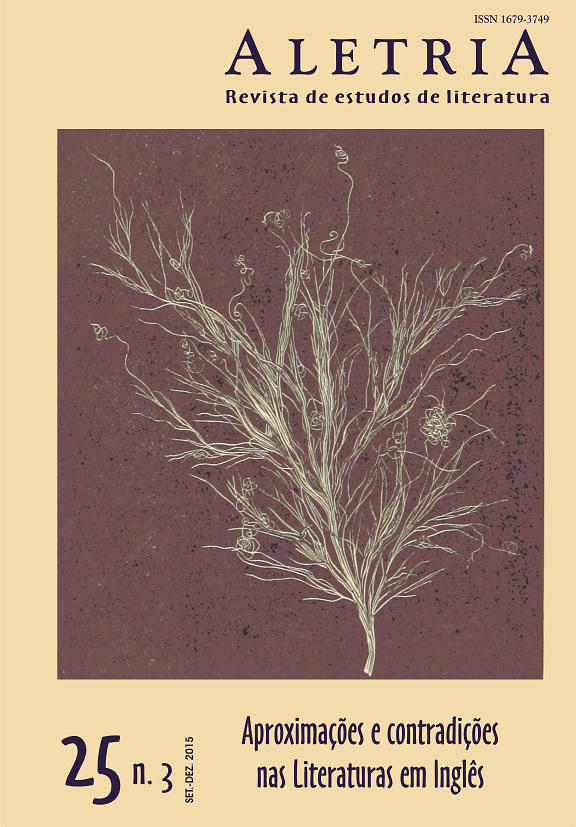A ressaca pós-industrial e o Laddism em Trainspotting
DOI:
https://doi.org/10.17851/2317-2096.25.3.49-65Palavras-chave:
Irvine Welsh, literatura escocesa contemporânea, laddism, drogasResumo
O artigo discute o impacto do cenário político e social das últimas décadas do século XX na produção literária escocesa, tendo como objeto de análise o romance Trainspotting (1993), de Irvine Welsh. Argumenta-se que o vácuo existencial potencializado pelo abuso de drogas não constitui o tema central da obra e que, na verdade, o livro problematiza o sentimento de letargia de uma geração desiludida com o modelo econômico da sociedade pós-industrial do fim do século XX. As drogas e a consequente inércia dos personagens de Trainspotting são representadas por Welsh como elementos de subversão em oposição ao modelo de sociedade profundamente consumista. Ademais, o desemprego massivo acaba criando novas relações sociais entre os homens e as mulheres, o que gera uma forte onda de afirmação que perpassa o machismo, o laddism.
Downloads
Referências
AB’SABER, Tales A. M. A música do tempo infinito. São Paulo: Cosac Naify, 2012.
BAKHTIN, Mikhail. Problemas da poética de Dostoiévski. Trad. Paulo Bezerra. Rio de Janeiro: Forense Universitária, 2010.
FISHER, Mark. Capitalist realism: is there no alternative? Winchester; Washington: Zero Books, 2009.
FISHER, Mark. Ghosts of my life: writings on depression, hauntology and lost futures. Winchester; Washington: Zero Books, 2014.
MORACE, Robert. Trainspotting: a reader’s guide. New York: The Continuum International Publishing Group, 2001.
MORETTI, Franco. A literatura vista de longe. Trad. Anselmo Pessoa Neto. Porto Alegre: Arquipélago Editorial, 2008.
OXFORD Dictionary. Oxford University Press, 2008. Disponível em: http://www.askoxford.com/concise_oed/trainspotter?view=uk. Acesso em: 27 set. 2015.
PECKHAM, Aaron. Urban Dictionary. USA, 2007. Disponível em: http://www.urbandictionary.com/define.php?term=trainspotting. Acesso em: 27 set. 2015.
POP, Iggy. Neon Forest. In: Brick by brick. Londres: Virgin Records. 54’09’’. 1 CD.
SANTAELLA, Lucia. Corpo e comunicação: sintoma da cultura. São Paulo: Paulus, 2004.
SARTRE, Jean-Paul. O existencialismo é um humanismo. Trad. Rita Correia Guedes. Tradução de SARTRE, Jean-Paul. L’Existentialisme est un humanisme. Paris: Les Éditions Nagel, 1970. Disponível em: http://stoa.usp.br/alexccarneiro/files/-1/4529/sartre_exitencialismo_humanismo.pdf. Acesso em: 27 set. 2015.
SLOTERDIJK, Peter. Se a Europa despertar. Trad. José Oscar de Almeida Marques. São Paulo: Estação Liberdade, 2002.
SMITH, Murray. Trainspotting. London: British Film Institute, 2002.
WELSH, Irvine. Trainspotting. New York: Norton, 1996.
Downloads
Arquivos adicionais
Publicado
Edição
Seção
Licença
Copyright (c) 2016 Fabiane Lazzaris, Lauro Iglesias Quadrado (Autor)

Este trabalho está licenciado sob uma licença Creative Commons Attribution 4.0 International License.
Autores que publicam nesta revista concordam com os seguintes termos:Autores mantém os direitos autorais e concedem à revista o direito de primeira publicação, com o trabalho simultaneamente licenciado sob a Licença Creative Commons Attribution que permite o compartilhamento do trabalho com reconhecimento da autoria e publicação inicial nesta revista.Autores têm autorização para assumir contratos adicionais separadamente, para distribuição não-exclusiva da versão do trabalho publicada nesta revista (ex.: publicar em repositório institucional ou como capítulo de livro), com reconhecimento de autoria e publicação inicial nesta revista.Autores têm permissão e são estimulados a publicar e distribuir seu trabalho online (ex.: em repositórios institucionais ou na sua página pessoal) a qualquer ponto antes ou durante o processo editorial, já que isso pode gerar alterações produtivas, bem como aumentar o impacto e a citação do trabalho publicado (Veja The Effect of Open Access).














